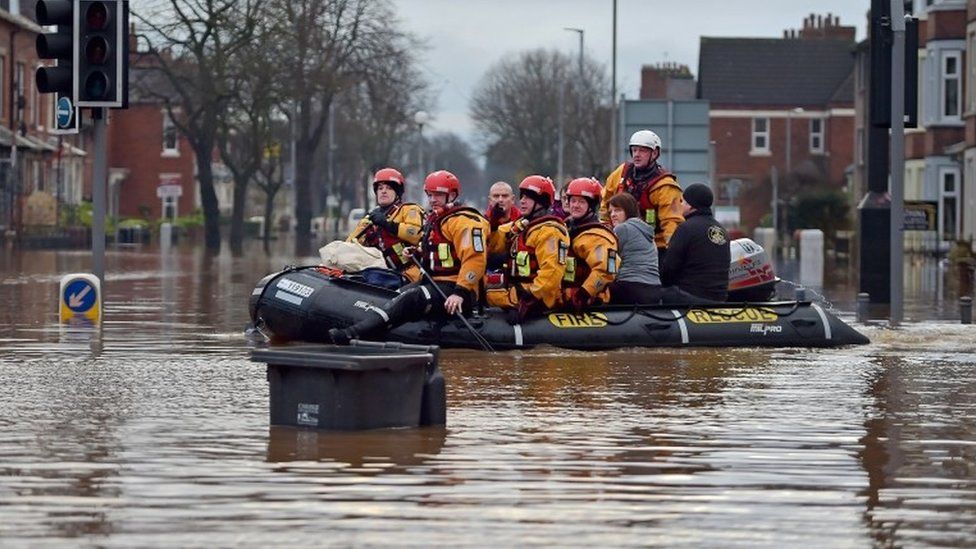Infrastructure 'still faces flood risk'
- Published

Britain's roads, bridges, railways, hospitals, electricity, gas, water and internet remain at risk from floods, a government review will admit.
It will say some services – such as electricity – are increasingly protected from extreme rains but others - like telecoms - lag behind.
BBC News understands the study will say rainfall should be managed from the source of the river to the sea.
The review was prompted by December's floods in the North of England.
Its conclusions will be widely welcomed, but some critics warn the report masks the full problem by ignoring some types of flooding.
That is because it focuses on floods on rivers and at the coast, whereas some floods are caused by rainfall failing to drain away far from rivers or the sea.
Swenja Surminski, from the Grantham Climate institute, told BBC News: "This review is supposed to be comprehensive, but it creates a false sense of security that if you're away from a river or the coast you're home and dry and that's not the message we need to be sending."
A source close to the report said it was a valuable exercise in using computer models to stress-test infrastructure under extreme conditions. Further study was needed on other surface water flooding, the source added.
The review is said to conclude that decision-makers have not grasped the full magnitude of flood risks.
It will say core cities around the UK need better protection, and many hundreds of locally significant installations need to be improved.
In the short term, more barriers must be stockpiled to protect sub-stations, water works, hospitals, ambulance stations and telecoms centres.
In the longer term, important equipment, such as controls for electricity, need to be raised higher, away from potential flood waters. Power networks should be adapted so they can still supply energy even if one sub-station is inundated.
A source said: "It is clear that there is a very variable picture, with some infrastructure protected much better than others.
"The Cumbria floods were thought to be a bit of a freak at the time but we now realise that we can expect to see more really extreme events in different parts of the country.
"Often, the local flood records only go back 50 years, so they don't show the full range of what might happen. Natural variability in weather is much bigger than we thought.
"We haven’t found a fingerprint of climate change on recent flood events – but they are in line with what scientists say we should expect with increased warming."
The review will say river catchments in the UK should be managed in a holistic way, ensuring that improvements on one part of the river do not make flooding worse elsewhere.
It will hold up the example of Cumbria's flood partnership, where flood walls will boost protection for infrastructure; peatland will be restored to hold water upstream; water storage in reservoirs will be increased in the winter; farm management will be altered to catch rainfall by subsoil ploughing; and trees will be planted and river bends restored.
This approach has already been pioneered in other areas.
There is no mention of costs in the study. The Environment Agency has previously said its flood protection work was adequately funded to 2021, but funding in the past has yo-yoed depending on the government’s perception of urgency at the time.
A recent report by the government's official advisors, the Committee on Climate Change, warned that infrastructure was so closely inter-related that the UK could suffer a domino effect in which one piece of infrastructure could cause the collapse of another.
The review was due to be published this week, but has been postponed because the politician in charge, Oliver Letwin, lost his seat in Cabinet. It is expected to be published in late summer, along with the government's progress towards a 25-year environmental masterplan for the UK.
- Published7 December 2015